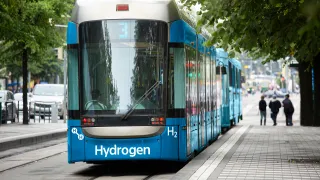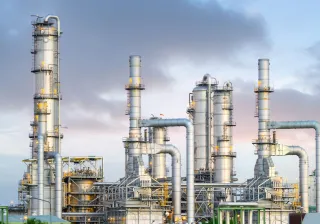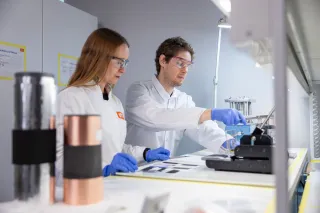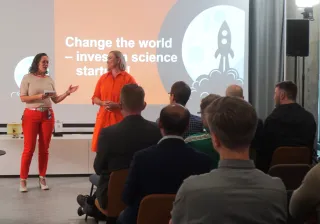As the world market for synthetic fuels keeps growing, VTT is conducting ambitious research into emerging new fuel alternatives called e-fuels.
The oil and gas industry is pivoting towards a less carbon-intensive energy mix – and one attractive option to replace fossil fuels at the moment are e-fuels (electrofuels). Utilising hydrogen produced by renewable electricity and carbon dioxide captured from industrial emissions or directly from the air to produce e-fuels is one of the most exciting options for the energy industry. The idea itself is not a new one, but the scale of possible applications is now more ambitious than ever.
According to European Environmental Agency, transport accounted for 25% of EU greenhouse gas emissions in 2018. This sector’s emissions come primarily from road transport (72%), while marine transport and aviation represent shares of 14% and 13% of emissions.
Electrofuels are important in road transportation since the sector currently covers a majority of greenhouse gas emissions. However, the highest potential of e-fuels lies in aviation and marine transport, where electric propulsion solutions are difficult to achieve.
E-fuels are still early in the game
The world’s oil refineries and the petrochemical industry are paying close attention to the situation. On the other hand, there is enormous demand for additional clean energy. However, the infrastructure required to produce pure hydrogen and perform carbon dioxide capture is still in the early stages.
Research Professor Juha Lehtonen from VTT points out that decarbonizing all industries is the broader theme in the green transformation. Still, Oil & Gas is a very significant industry to consider in this equation.
“Oil industry probably has to replace fossils within 20-30 years. The e-fuels provide one way to create new business, and in addition, a more sustainable one,” says Lehtonen, adding that in the long run, the revenues from the new green fuel business could be higher, too.
Ways of producing e-fuels
Electrolysis technology key in producing synthetic fuels – and predicted to grow more than 20-fold during the next five years.
In electrolysis, electricity is used to split water into oxygen and hydrogen. The hydrogen produced by electrolysis is combined with carbon dioxide to form gaseous or liquid hydrocarbons through synthesis processes.
Biotechnological conversions like gas fermentation can fix CO2. Senior Research Scientist Antti Nyyssölä from VTT points out that biotechnological conversions have certain advantages over catalytic conversion processes: “When you use bacteria in the biotechnological conversions, you don’t necessarily have to purify the gases as extensively, as is the case with the catalytic conversion.”
Is comparing e-fuel technologies worth it?
Senior Scientist Laura Salusjärvi from VTT adds that biotechnological conversions can yield various products from bacteria. “Microbial oil can be manufactured from bacteria producing high concentrations of lipids,” she says.
Performing CO2 capture from the air is quite energy-consuming and expensive. Also, CO2 does not exist in air in large concentrations. However, capturing CO2 from industrial streams is one option that has potential for the future.
All three VTT researchers agree that comparing various e-fuel making technologies is entirely pointless since there are pros and cons attached to all of them. “We need all these different technologies, and there is no one winner in all this,” says Juha Lehtonen.
See beyond the e-fuel hype
The researcher trio suggests that there is some hype surrounding the e-fuels – since large-scale solutions are still years away – but the need is there already. If by 2030, one-third of all cars run on electricity, that still leaves most vehicles on the road that could deploy green fuels.
“Large volumes of e-fuels will surface eventually, probably in the 2030s,” says Lehtonen, adding that with high volumes, also the need to use electricity in the manufacturing process grows considerably.
VTT has comprehensive experience in developing technologies for alternative fuels. Order a white paper where we tell more about our offering.
This blog was originally published in 2021 and revised in 2023.








